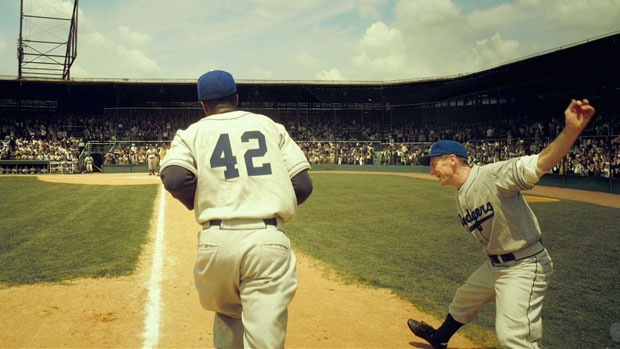Today,
April 15, is a historic day. Yes, I know
that it is Tax Day. I completed my tax
return back in February. No, today is
historic for another reason. For on 15
April 1947, America changed. Good got
the drop on evil. Belief took a shot at
ignorance. Faith leapt ahead of
hatred. Jackie Robinson came to bat for
the Brooklyn Dodgers. America would
never be the same. And on this issue,
all I can say is thank God.
In
1947, two years following the end of World War II, minorities in America were
still feeling the weight of racial oppression.
All different stripes of Americans had fought and died side by side in
Europe, Africa and the South Pacific, yet they could not eat the same restaurants
or drink from the same water fountains. However
that was going to change. And the advent
of this change did not come from a crowd gathered at a memorial in our nation’s
capital; it came in an office in Brooklyn.
This
is the story that 42 wishes to tell. It wishes to tell the story of how one old,
cranky, white baseball man challenged one, young, black baseball player to help
him change the world. Sure Branch Rickey
(Harrison Ford) wanted to make money. He
knew people would pay to see a black man smack homeruns off of white pitchers
and steal bases from white catchers. Yet,
deep down in his soul, Rickey was nursing a regret, a regret that he had not
done more. Thus he turns to Jackie
Robinson (Chadwick Bozeman), a young ballplayer full of personality and power to help
right the wrongs caused by prejudice and ignorance.
This
film is too good to spoil by telling you much more about it. Also, it is a historical biopic piece, which
means there has been some polishing and tweaking. Great care has been given to making this a
great movie about a great man. Heroes are
heroes (Jackie, Branch Rickey, Pee Wee Reese, etc.) and villains are villains
(Phillies manager Ben Chapman, a town sheriff in Florida, and a couple of
Robinson’s teammates). Yet if baseball
ever had a saint, it was Jackie Robinson.
If you want the “box score” on Robinson’s life, I recommend the Wikipedia
article, recently updated in honor of the film and the ongoing construction of
the museum in
Manhattan. It is a sports film, yet it
is not like Eight Men Out. It is not simply a historical narrative of
events and people and games played. It
is a sports film like We Are Marshall
and Miracle are sports films. It has a spiritual message for a broken
world: When we believe in good, good will overcome evil. And in this case, good overcomes evil by
hitting a monstrous homerun!
Obviously,
the racial tension is the thread that weaves the plot of this film. I am an avid baseball fan, and I believe
deeply in social justice. My wife and I wanted
to see this film, yet we questioned whether or not to take our children who are
elementary-age to see it. We have taught
our children that racism is not only wrong but sinful. Martin Luther King, Jr., is a name we hold in
reverence. (Ultimately, we took our son and left our daughter with my parents.) Yes, there is some profanity
and a little bit of drinking in this film. The film does not spare famed manager Leo Durocher his public flaws of
alcoholism and adultery. And Harrison Ford
smokes enough cigars to burn down Ebbets Field.
My concern was the constant use of racially-motivated derogatory
language (you know that sad, offensive word).
Yet, the scene where Philadelphia manager Ben Chapman (Ben Tudyk) lashes
Robinson with a verbal barrage that could have broken even the hardest
hard-core rapper proves to be the strongest teaching moment about the evils of racism
that I have viewed in a film since Glory. I agree with Alynda Wheat’s comments: “He
insults the player in language so blisteringly foul, you may question whether
to take your kids. I say take them. The film provides plenty of teachable
moments: form the painful to the triumphant, lessons too many of us have
forgotten or perhaps never knew. And if
the Robinson adoration begins to feel like a bit much, it’s okay. Some things need to be glorified.”[1] You will leave this film with a lump in your
throat, a tear in your eyes and a burning desire in your heart. And for that I say, thank you, Jackie.

No comments:
Post a Comment